Russian President Vladimir Putin expressed his optimism for a peaceful resolution in the Karabakh (Garabagh) region.
Speaking at a meeting with Chinese Foreign Minister Wang Yi in St. Petersburg, Putin emphasised Russia's active engagement with all parties.
"I hope that we will be able to achieve de-escalation and transfer the solution of this problem to a peaceful course," TASS quoted Putin as saying on Wednesday.
Putin also stressed the efforts of Russian peacekeepers in their engagement with all parties.
“They are doing everything to protect civilians,” he said.
These statements followed a series of events in the Karabakh region, where the Azerbaijan Armed Forces on Tuesday initiated local anti-terrorist measures to neutralize illegal Armenian armed formations and their military infrastructure in the Karabakh region.
The operations came in response to increasing attacks on Azerbaijani positions and recent tragic incidents involving landmines in the Khojavand district, which resulted in the loss of four Azerbaijani police officers and two road construction workers.
Earlier on Tuesday, two Azerbaijani servicemen stationed in the Aghdam district were wounded by the Armenian armed formations that were illegally deployed in Azerbaijani territories temporarily monitored by Russian peacekeeping forces.
By the time of the cessation of hostilities, the Azerbaijani military had disabled artillery systems, radio-electronic warfare capabilities, military equipment, ammunition depots, military strongholds, and shelters belonging to Armenian army formations stationed in the Karabakh region.
The Defense Ministry of Azerbaijan announced on Wednesday the end of the local counter-terrorism measures in the Karabakh region.
According to the ministry, the appeal by the representatives of the Armenian residents living in the Karabakh region, conveyed by the Russian peacekeeping command, was considered to cease the local anti-terror activities at 1:00 p.m. on Wednesday.
The agreement was reached under a set of terms, including the requirement for Armenia's armed forces in the Karabakh region of Azerbaijan and illegal armed groups to disarm, withdraw from battle positions and military posts, and undergo complete disarmament.
Armenia's armed forces were also obligated to leave Azerbaijani territory, and illegal Armenian groups be disbanded. Simultaneously, the surrender of all ammunition and heavy military equipment was mandated.
The Karabakh (Garabagh) region is a territory internationally recognized as belonging to Azerbaijan.
Tensions surrounding the Karabakh region date back to the last days of the Soviet era, when Armenians began to claim the Azerbaijani lands as their own. Following the dissolution of the Soviet Union in 1991, Armenia launched a full-scale military campaign against Azerbaijan. The bloody war persisted until a ceasefire agreement was reached in 1994. As a result of the war, Armenia occupied 20 percent of Azerbaijan’s internationally recognized territories. Over 30,000 ethnic Azerbaijanis were killed, and one million were expelled from those lands in a brutal ethnic cleansing policy carried out by Armenia.
On September 27, 2020, the conflict between the two countries escalated when Armenian forces deployed in the occupied Azerbaijani lands shelled military positions and civilian settlements of Azerbaijan. During the counter-attack that lasted 44 days, Azerbaijani forces liberated over 300 settlements, including the cities of Jabrayil, Fuzuli, Zangilan, Gubadli, and Shusha, effectively ending the nearly 30-year-long illegal Armenian occupation. The war ended in a tripartite statement signed on November 10, 2020, by Armenia, Azerbaijan, and Russia. Under the statement, Armenia also returned the occupied Aghdam, Kalbajar, and Lachin districts to Azerbaijan.
The tripartite agreement addressed the deployment of a Russian peacekeeping contingent consisting of 1,960 servicemen, 90 armored personnel carriers, and 380 units of an automobile and special equipment in the certain parts of Azerbaijan’s Karabakh region, including the city of Khankendi. The ongoing mission of the peacekeepers in the region is scheduled for five years.







 U.S. Secretary of State Antony Blinken reiterated Washington’s unwavering support for the ongoing peace process between Azerbaijan and Armenia in a...
U.S. Secretary of State Antony Blinken reiterated Washington’s unwavering support for the ongoing peace process between Azerbaijan and Armenia in a...
 The Iranian and Cuban transport ministers have discussed expanding maritime and air transportation cooperation.
The Iranian and Cuban transport ministers have discussed expanding maritime and air transportation cooperation.
 Kyrgyzstan has joined the extensive reconstruction efforts in the Karabakh region of Azerbaijan, after a series of mega initiatives were launched b...
Kyrgyzstan has joined the extensive reconstruction efforts in the Karabakh region of Azerbaijan, after a series of mega initiatives were launched b...
 Iran is moving to fortify its eastern border with Afghanistan in a bid to fight illegal migration and drug trafficking, along with enhancing security.
Iran is moving to fortify its eastern border with Afghanistan in a bid to fight illegal migration and drug trafficking, along with enhancing security.



